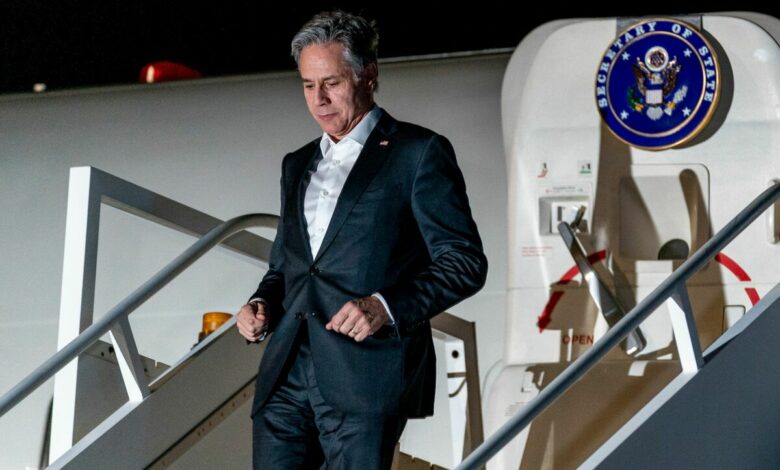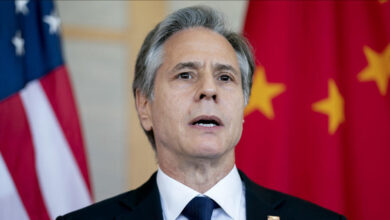Blinken and the Tactical Approach in the Middle East: “Israel’s Last Chance: What Lies Behind the Enemies’ Puzzle?”

Fatn Jabari, Department of International Relations and Strategic Affairs March 21, 2024
Introduction
For the sixth time since the war on Gaza has begun, U.S. Secretary of State Antony Blinken conducted a tour in the Middle East, initiating talks that began in Saudi Arabia in hopes of reaching a ceasefire in Gaza and Red Sea attacks, amidst escalating tensions in Washington’s relationship with its ally Israel.
Blinken headed to Saudi Arabia yesterday and today arrived in Cairo, with expected meetings in Qatar, Jordan, and the UAE, along with the Secretary-General of the Executive Committee of the Palestine Liberation Organization. He will also discuss with the Turks the final steps for Turkey’s approval of Sweden’s accession to NATO.
The Middle East tour, unusually, finds America this time in a “confused regional posture,” so which strategy will overturn the equation?
And what lies behind the puzzle of the adversaries?
Who is Antony Blinken and what is his outlook for the Middle East
Tony Blinken is an American diplomat and politician who witnessed all the wars in the Middle East: Iraq, Syria, Yemen, Sudan, and also Libya. Born in 1962 to Jewish parents, he served as the 71st U.S. Secretary of State, working for nearly 30 years in various security and political positions within the U.S. government, in addition to his contributions to the private sector in the field of research and strategic consulting, with a long history in diplomatic operations.
Antony is also a seasoned politician in the national security establishment and Central Intelligence Agency and foreign policy. His government career began in 1994 when he worked in the National Security Council under President Bill Clinton.
For Blinken, Europe represents America’s historical partner, where his book “Ally Versus Ally” and defense policy and information technology within the framework of the international security program are among Europe’s most famous contributions during the past century.
Blinken was an advocate for the United States playing a more active role in the intervention in the Syrian conflict and during the U.S. invasion of Iraq in 2003, and he supported armed intervention in Libya.
Blinken still believes that diplomacy should be accompanied by deterrence, and that “force can be an assisting and necessary element for effective diplomacy.”
First – War Cessation Policy : “Throwing ashes into the Eyes” Deception and truth manipulation
Blinken is seen as the literal translator of American doctrine policies in the Middle East since they laid their eyes in there.
Since October 7th, the U.S. administration has taken action on all levels: militarily by deploying both the Eisenhower aircraft carrier and the most lethal weaponry, as the U.S. Treasury allocated trillions of dollars as war expenses, demonstrating its absolute solidarity with Israel.
This strong solidarity was also apparent clearly on diplomatic levels, so Blinken is not expected to be successful in his mission as required, because the offers he presented are limited to the release of about 200 Palestinian prisoners held by Israel in exchange for the release of 35 prisoners in Gaza, including Americans, at a time when both, the voices of Americans and the world are rising to accuse the Biden administration alongside the Pentagon and demand an immediate cessation of the war, coinciding with the American elections.
Thus, Blinken’s card is not in favor of the Palestinians at all, as much as it is the strong card available to Hamas so far, and it is the card of these detainees.
Perhaps Blinken will try to link this issue to the overall scene in Gaza after the ceasefire, not to mention that Washington does not support a wide Israeli ground operation in Rafah, as the United States tries to say that the Palestine Liberation Organization should be concerned with returning to Gaza and taking charge there, an offer that Hamas and Israel may not accept.
U.S.-Israel Disputes
Blinken’s need to conduct six tours to the region “forecasts the major differences between Washington and Tel Aviv.”
Blinken’s current tour is expected to support further American pressure on the government of Israeli Prime Minister Benjamin Netanyahu, and push him to accept proposals including a ceasefire and prisoner exchange, especially since there are Americans held by Hamas.
Netanyahu fears any American regrets over the weapons that the United States has provided Israel with throughout the past period, or about American military advisers within the Israeli army who manage operations, or U.S. Delta forces, the number one faction in Israel and the Red Sea.
The extremist Zionist Israeli Minister Ben Gvir threatens to oppose, as he is the extremist party in Netanyahu’s government, refusing any deal for exchange or ceasefire, and threatening to bring down the government if a deal is made with Hamas, and more than that, Israel wants to establish in Gaza an absolute military authority, which threatens the entire region to rebel.
Second – the Red Sea: Houthis, then Iran and armed groups
Another equally important file for Washington during its foreign minister’s tour is the effort to maintain “stability” in the region and prevent the expansion of the war to involve other parties, especially Iran and the armed groups it supports in the region from Lebanon, Syria, and Iraq.
Following the United States and Britain’s military strikes on several targets in locations of the Houthi group in response to Houthi attacks on ships in the Red Sea, where the region lives on a hot plate with shelling at “Al-Burj 22” base in Jordan resulting in the killing of American soldiers claimed by the Islamic Resistance in Iraq.
The Iranian file
Blinken has been a vocal supporter of the nuclear agreement with Iran, which Benjamin Netanyahu’s government perceives as a serious threat parallel to Israel’s program and to the region.
Blinken was part of the administration that mediated and negotiated for an agreement with Iran, under which Tehran pledged to scale back its nuclear program in exchange for the lifting of economic sanctions imposed on it.
Promoting Biden’s campaign with Arab rulers
On the other hand, one of Blinken’s pillars in the State Department will be to change Washington’s relations with what he describes as “authoritarian rulers” in the region, as he has repeatedly criticized during Biden’s presidential campaign Trump’s close relations with human rights violators, specifically in Egypt and the Gulf.
Blinken works to promote Biden’s campaign by supporting “the principles of human rights in dealing with governments in the region,” criticizing the policy of his American counterpart by saying “when Trump describes the Egyptian President Sisi as his favorite dictator, it has a significant impact undermining America’s moral stance globally and our ability to lead.”
Conclusion
As former U.S. Secretary of State “Henry Kissinger” once said shortly before his death, “the fuse of a third world war is not far from the tragic reality lived by the international community.”
Indicating that “it is imperative for the U.S. administration to change its stance in the game.”
This idea reflects, from an obscure perspective, the intentions of the American administration, which Blinken’s deep visit to the Middle East for 7 consecutive times translates into messages regarding the mismanagement of Netanyahu’s administration of the tasks entrusted to it in this region in particular, which has already threatened America’s interests there.
For America, the current Israeli incumbent is no longer capable of managing, failure followed by change, and it may be the last chance for the Biden-led American administration to abandon Netanyahu’s government, to be replaced by a new government starting its work from the day following the end of the war on Gaza.





